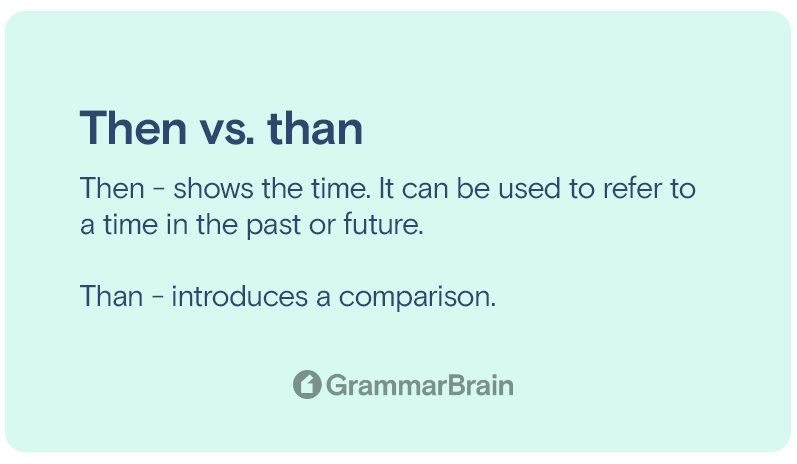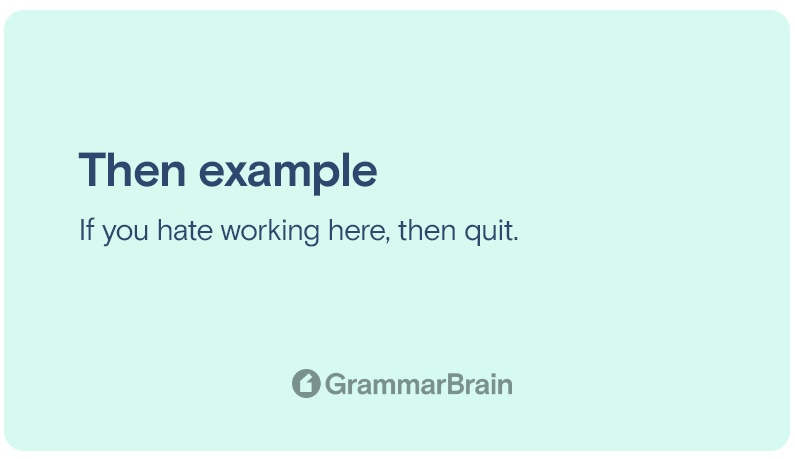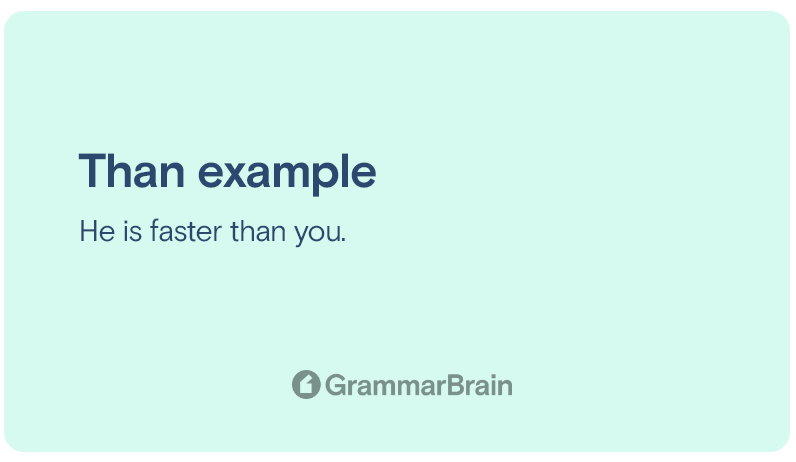Here’s when to use then vs. than. Many people have the wrong idea that ‘then’ and ‘than’ can be used interchangeably. But that is wrong because both these words are very different. They have different meanings. A detailed study of ‘then vs. than’ today will clear any confusion that you might have too.
Then vs. Than: Different parts of speech
‘Then’ is mostly used as an adverb to refer to a certain time in the past or future. It helps to explain the chronological order of events. ‘Then’ is a linking adverb and an adverb of time. However, it can also be used as a noun or adjective.
‘Than’ is mostly used as a subordinating conjunction but it can be used as a preposition too. It is commonly used while making comparisons. In either part of speech, ‘than’ helps to introduce an exception or the second element in a comparison.

Then vs. Than: Word functions
A non-native English speaker or learner can get confused between two similar-sounding words. Let’s have a look at how and when each word is used.
What is a function word?
A function word is a word that has little lexical meaning or has an ambiguous meaning. It is used to express grammatical relationships among other words within a sentence. Typically to specify the attitude or mood of the speaker.
Both ‘then’ and ‘than’ are function words (as well as a conjunction, preposition, and noun).
Understanding “then”
Then – shows the time. It can be used to refer to a time in the past or future.
Examples:
- You were leaner then. (Indicating the past)
- Let the rain stop, then I will go for my morning jog. (Indicating the future)
It is also used for stating the condition for doing something, where it stands for ‘in that case’.
Understanding “than”
Than – introduces a comparison.
Examples:
- If you don’t like it, than you can leave.
- He is faster than you. (Indicating a comparison)
Now let’s look at some more explanations that will help us correctly choose ‘then’ and ‘than’ in sentences.

When to use ‘then’?
As we have already seen, then can show or mean three things – next, condition, or ‘at that time’. You can use ‘then’ to show the order of things happening. For instance, “I will take pick up the groceries and then start cooking”.
You can use ‘then’ to indicate a previous time. For instance, “Back then, we did not have smartphones”. Here, then is telling about a previous time when there were no smartphones.
‘Then’ also can show the order or chronology. For instance, “ First do your math homework and then complete your science project.”
Use of ‘then’ in sentences
These examples tell us how ‘then’ can be used in sentences:

When to use ‘than’?
You can use ‘than’ when you want to point out a difference. For instance, “You are stronger than her.”
It can be used for comparisons. For instance, “I love country music more than I love pop songs.”
Use of ‘than’ in sentences
These examples tell us how ‘than’ can be used in sentences and to indicate what:
- He is older than I am.
- This swimming pool is bigger than that pond.
- The test was easier than I had expected.
Then vs. than: How to remember the difference
These two words are homonyms, they look and sound similar. That makes people confused about when or how to use them correctly. But there is a simple trick that can help you remember and use them appropriately.
Remember to check the third alphabet of ‘then’ and ‘than’. ‘Then’ is mostly used as an adverb and is used in reference to time. The third alphabet in the word is ‘e’.
Both the words ‘then’ and ‘time’ have the alphabet ‘e’ in them. So you have to use ‘then’ when talking in reference to time.
Similarly, the third alphabet of ‘than’ is ‘a’. ‘Then’ is used for comparisons and is used as a comparative adjective or adverb.
Both the words ‘than’ and ‘comparison; have the alphabet ‘a’ in them. So you should use ‘than’ while drawing comparisons.
Than vs. then exercises
Here are some simple exercises to remember than vs. then:
- They didn’t want to go to the store. It was less ____ normal.
- We didn’t have any food, ____ we went to the store.
- Rather ____ go to the movies, we decided to go to dinner.
Answers:
- Than
- Then
- Than
Common questions
Is it less then or less than?
The correct phrase is less than. For example, “less than the other.”
Is it well then or well than?
The correct phrase is “well then.” For example, “well then, we need to go the store.”
Is it better than or better then?
The correct phrase is better than. For example, “I am better than the other person in the basketball game.”
Is it other than or other then?
The correct phrase is “other than.” For example, “Other than the idea that we didn’t make it.”
Is it rather then or rather than?
The correct phrase is “rather than.” For example, “Rather than having to do the job twice, we did it once.”
Is it earlier than or earlier then?
Both phrases are correct given the context of how they are getting used. For example, “Is it earlier than the other?” Or “it was earlier then usual that we left for school.”
Is it more then or more than?
The correct phrase is more than, since it is typically used in sentences comparing two things.
Inside this article
Fact checked:
Content is rigorously reviewed by a team of qualified and experienced fact checkers. Fact checkers review articles for factual accuracy, relevance, and timeliness. Learn more.
Core lessons
Glossary
- Abstract Noun
- Accusative Case
- Anecdote
- Antonym
- Active Sentence
- Adverb
- Adjective
- Allegory
- Alliteration
- Adjective Clause
- Adjective Phrase
- Ampersand
- Anastrophe
- Adverbial Clause
- Appositive Phrase
- Clause
- Compound Adjective
- Complex Sentence
- Compound Words
- Compound Predicate
- Common Noun
- Comparative Adjective
- Comparative and Superlative
- Compound Noun
- Compound Subject
- Compound Sentence
- Copular Verb
- Collective Noun
- Colloquialism
- Conciseness
- Consonance
- Conditional
- Concrete Noun
- Conjunction
- Conjugation
- Conditional Sentence
- Comma Splice
- Correlative Conjunction
- Coordinating Conjunction
- Coordinate Adjective
- Cumulative Adjective
- Dative Case
- Determiner
- Declarative Sentence
- Declarative Statement
- Direct Object Pronoun
- Direct Object
- Diction
- Diphthong
- Dangling Modifier
- Demonstrative Pronoun
- Demonstrative Adjective
- Direct Characterization
- Definite Article
- Doublespeak
- False Dilemma Fallacy
- Future Perfect Progressive
- Future Simple
- Future Perfect Continuous
- Future Perfect
- First Conditional
- Irregular Adjective
- Irregular Verb
- Imperative Sentence
- Indefinite Article
- Intransitive Verb
- Introductory Phrase
- Indefinite Pronoun
- Indirect Characterization
- Interrogative Sentence
- Intensive Pronoun
- Inanimate Object
- Indefinite Tense
- Infinitive Phrase
- Interjection
- Intensifier
- Infinitive
- Indicative Mood
- Participle
- Parallelism
- Prepositional Phrase
- Past Simple Tense
- Past Continuous Tense
- Past Perfect Tense
- Past Progressive Tense
- Present Simple Tense
- Present Perfect Tense
- Personal Pronoun
- Personification
- Persuasive Writing
- Parallel Structure
- Phrasal Verb
- Predicate Adjective
- Predicate Nominative
- Phonetic Language
- Plural Noun
- Punctuation
- Punctuation Marks
- Preposition
- Preposition of Place
- Parts of Speech
- Possessive Adjective
- Possessive Determiner
- Possessive Case
- Possessive Noun
- Proper Adjective
- Proper Noun
- Present Participle
- Prefix
- Predicate



